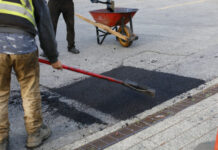Asphalt millings have become an ideal raw material for building roads, as they are relatively affordable and have a long life. But when it comes to constructing driveways for homes or businesses, people often opt for the traditional gravel. The reason? Well, because most people are simply unaware that there are highly efficient substitutes of gravel-like asphalt millings — out there.
Asphalt millings are durable raw materials that offer many more benefits than gravel. Let us dive deep into what milled asphalt is and whether it is the right choice for your driveway.
What are Asphalt Millings?
 To understand asphalt millings, you need to know about the single most important quality of asphalt — asphalt is recyclable. It is America’s most recycled material, and as much as 95% of asphalt used on roadways and highways is reclaimed.
To understand asphalt millings, you need to know about the single most important quality of asphalt — asphalt is recyclable. It is America’s most recycled material, and as much as 95% of asphalt used on roadways and highways is reclaimed.
Once old asphalt has served its purpose and is no more functional, it is recycled — and asphalt millings are born from the ‘death’ of the old asphalt. When asphalt pavements lose their functionality, they undergo milling, which helps them regain their serviceability. Milling refers to the process where the topmost layer of existing asphalt pavement is removed using a milling machine before a resurface or overlay. This process evades the need to destroy the entire pavement and build a new one from scratch.
 When this top layer is removed, it is crushed into gravel-size pieces — or a specified depth — that harden when compacted. This grounded material is called asphalt millings, which serve several purposes. One way it is used is as a raw material for driveways. The best part is that milled asphalt forms a more robust surface when properly compacted. Thanks to this, milled surfaces also make a strong foundation for ensuing paving with another material like tar. Asphalt millings can also be used in other low-cost construction projects since they are durable, cost-effective, and can even withstand the harshest of weather conditions.
When this top layer is removed, it is crushed into gravel-size pieces — or a specified depth — that harden when compacted. This grounded material is called asphalt millings, which serve several purposes. One way it is used is as a raw material for driveways. The best part is that milled asphalt forms a more robust surface when properly compacted. Thanks to this, milled surfaces also make a strong foundation for ensuing paving with another material like tar. Asphalt millings can also be used in other low-cost construction projects since they are durable, cost-effective, and can even withstand the harshest of weather conditions.
Though many property owners are unaware of what asphalt millings can do for them, the latter is a better alternative to regular gravel, as they have some extraordinary characteristics.
“But, is Asphalt Millings a good choice for me?”
 Considering its many benefits, milled asphalt is a fantastic option if you plan to install a new pavement for a residential or commercial space. When installed by a skilled asphalt paving contractor and when compacted with significant pressure, a milled surface is more robust.
Considering its many benefits, milled asphalt is a fantastic option if you plan to install a new pavement for a residential or commercial space. When installed by a skilled asphalt paving contractor and when compacted with significant pressure, a milled surface is more robust.
Though milled surfaces may not be ideal for high-traffic streets, it is the best option for private roads and driveways. Since private driveways do not receive high traffic throughout the day, a milled surface is bound to last longer without requiring frequent maintenance.
Here are some benefits of having a driveway made from asphalt millings:
- As asphalt millings are recycled, they are an affordable raw material.
- Milled surfaces are eco-friendly, as the quantity of fuel used to recycle asphalt is relatively less than the fuel required for asphalt aggregate mining and processing.
- A milled surface is more durable than the one made of traditional gravel. It perfectly seals and becomes a fully functional, strong pavement when compacted with proper equipment.
- It is highly unlikely for milled surfaces to require frequent treatment. Their low maintenance makes them a go-to choice for busy property owners.
- Milled surfaces can resist inclement weather — even the snow melts more quickly on milled driveways than on gravel surfaces.
Conclusion
Driveways are an important element of any property. Therefore, they need to be of high quality. To steer clear of frequent driveway-related headaches, choose a premium — yet affordable — material like asphalt millings.
Address
Commonwealth Paving, 136 Outerloop, Louisville, Kentucky 40214
Phone: 502-459-7283, Fax: 502-456-2678
Opening Hours
| Monday | 8:00 a.m. – 5:00 p.m. |
| Tuesday | 8:00 a.m. – 5:00 p.m. |
| Wednesday | 8:00 a.m. – 5:00 p.m. |
| Thursday | 8:00 a.m. – 5:00 p.m. |
| Friday | 8:00 a.m. – 5:00 p.m. |
| Saturday | Closed |
| Sunday | Closed |







